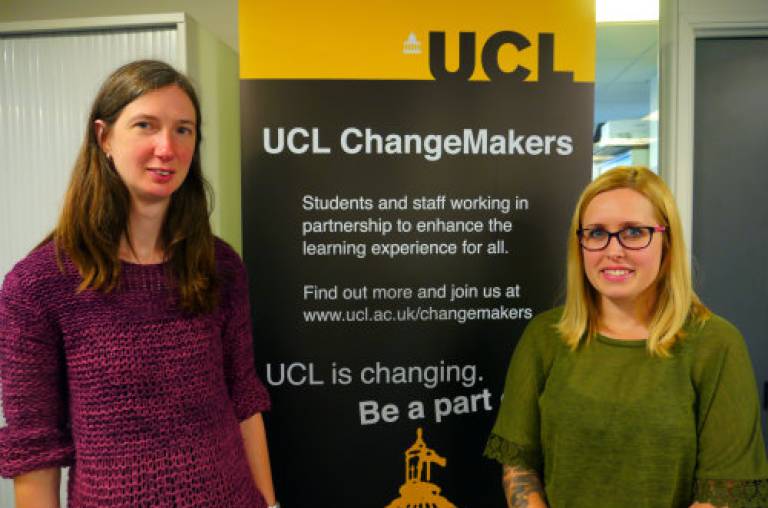Q&A with the UCL ChangeMakers team
18 August 2015
The UCL ChangeMakers team, Abbie King & Dr Jenny Marie share how student-led projects are enabling our learners to feel “more empowered, less passive and a co-constructor in their education.”

What are you working on at the moment?
We have just come to the end of our first, or pilot year, of UCL ChangeMakers, which went really well. We had 10 projects and worked with 24 students supporting and encouraging their ideas for developing and enhancing their learning experience at UCL. One of the best things about working with the students is that you realise how much they care about UCL and want to make it the best it can be. We think a lot of them like the idea of leaving behind a tangible impact that lasts beyond their time here.
We’ve learnt a lot from this year, both in terms of what the students value but also how to make this an even better experience where they can truly achieve their aims. We are now planning 2015/16 of UCL ChangeMakers which we hope will attract more students. One big change for the students next year will be increased online and face-to-face training. For starters we will have an initial training session which will get all the students together to give them core educational research skills and also it will be an opportunity for them to meet each other so we can build up a community of peer support on the projects.
What advice would you give to someone looking to develop the way they teach?
Well, funnily enough, we have another new addition this year: the UCL ChangeMakers staff grants. If you are looking to develop your teaching, you could think about applying for one of these £500 grants where you will work with students to develop your teaching in line with the Connected Curriculum. We believe that staff and students working together on projects that both consider to be of value will maximise creativity, energy and enthusiasm and help develop communities of learning in a department where everyone feels included, respected and valued.
What piece of technology do you find invaluable in your teaching?
In developing the online training, we were keen not to reinvent resources already available, so we looked into several resources including Lynda.com. The playlists for staff and students are a good start, but the variety of training videos on it that are directed at higher education go well beyond them and are well worth a look.
How do you expect higher education to change in the next five years?
When the higher student fees were introduced, all the talk was of students as consumers but both staff and students (particularly the NUS) have pushed back against this and we’ve started moving towards a partnership model. We think this movement is likely to get even stronger with the proposed Teaching Excellence Framework because that will direct the focus of Higher Education Institutions onto the student experience even more.
UCL’s in a good starting place and in five years we would hope that UCL ChangeMakers and the Connected Curriculum will have given UCL a huge push to becoming a world leader in research-based education. We would like our students to feel valued and invested in UCL as well of course as challenged and excited by the education they receive and the opportunities on offer.
What achievement are you most proud of?
We are really proud of UCL ChangeMakers. At the end of the year we conducted interviews with some of the students who ran projects and hearing their reflections on what taking part meant for them was really humbling. The students talked about their amazement that they were given time, funding and support to develop their projects and that we trusted them to go out and do a piece of research that was important to them. They talk about feeling more empowered, less passive and a co-constructor in their education. We don’t think we could have received better feedback than that.
Dr Jamie Harle asks: If you are in a teaching specialist role, how do you keep up to date with trends and innovations in the field you teach? Is it through scholarship activity, such as placements or otherwise, through research? UCL needs to keep its teachers engaged and informed of forefronts in their field, and I wonder how this is done by others.
We both read the literature on students as change agents, browse our competitors’ websites and talk to colleagues in other universities, mainly at one-day events and the odd teaching conference. Next year we’d like to visit some other universities and maybe shadow colleagues. The difficulty is finding the time – I (JM) have started putting aside protected time in my diary just for this, because I know that if I don’t do it we won’t be able to provide a quality service for our students and staff.
What question would you like to pose to the next interviewee?
UCL ChangeMakers encourages staff and students to work together as partners. If you have experience of this, what was the best and most challenging things about it? If you don’t have any experience of it, what do you think it could bring to your department and is there anything that is stopping you from giving it a go?
 Close
Close

